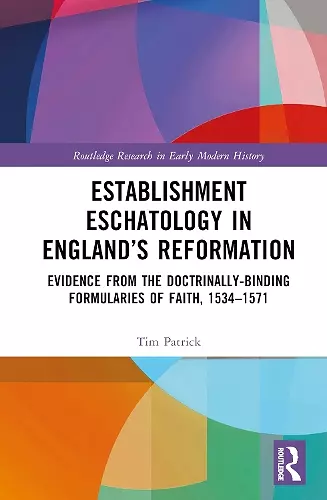Establishment Eschatology in England’s Reformation
Evidence from the Doctrinally-Binding Formularies of Faith, 1534–1571
Format:Hardback
Publisher:Taylor & Francis Ltd
Published:14th Jul '23
Currently unavailable, and unfortunately no date known when it will be back
This hardback is available in another edition too:
- Paperback£39.99(9781032305394)

Exploring what the early English Protestants came to believe about the afterlife, and how they arrived at their positions, this much-needed book fills a gap in the scholarly literature. In surveying the authorised doctrinal works of the English church through the Reformation period, the progress of eschatological thinking is traced from the earliest days of change to the solidification of the formularies which remain binding across the worldwide Anglican Church today.
Fresh observations are made on some well-known texts such as the Books of Common Prayer, Articles of Religion and official Tudor homilies, and these are complemented by commentary on surprisingly understudied documents of the period including primers, catechisms, and the paratexts of the early printed English Bibles. The result is a fascinating study of the English reformers’ navigation past both Roman Catholic and radical anabaptist beliefs, and it shows that their arrival at a relatively barren destination was due in part to a complete switch in theological priorities and in part to a fear of the implications of formally adopting some of the highly contested views.
Establishment Eschatology will prove to be an important resource for students and scholars of England’s early modern religious and cultural history.
Much scholarly research in English Reformation doctrine has focused on the changing nature of justification and the eucharistic presence in the Henrician, Edwardian and Elizabethan Formularies. Tim Patrick’s Establishment Eschatology is to be commended for expanding both the doctrinal context and the formularies which establish it. First, Patrick argues that Bibles, catechisms and primers are equally important sources for official Church of England doctrine alongside the Prayer Books, Homilies and Articles of Religion. Then, by examining them for their approach to eschatology, he links the English Reformers’ crucicentric soteriology, with its concomitant de-emphasis of a transformative resurrection, not only to the formularies’ rejection of Purgatory, Indulgences, the Apocrypha and Invocation of Saints but also to their insistence on a spiritual eucharistic presence. Indeed, because salvation depended exclusively on solifidanism, Patrick argues that the English Reformers came to demote as adiaphora any Protestant alternatives to the pre-Reformation or Radical Reformation descriptions of the afterlife which they had rejected. Those looking for a fresh perspective on the doctrinal debates of the Reformation in England will be rewarded by reading Establishment Eschatology.
Dr Ashley Null, Researcher of the private theological notebooks of Thomas Cranmer, Humboldt University of Berlin, and Visiting Fellow, Faculty of Divinity, The University of Cambridge, UK.
Students and scholars alike are indebted to Dr Patrick, who has trawled the official statements of the Church of England during the Reformation to discover what they say about eschatology, a fascinating but all too often neglected subject. In the process he has enriched our knowledge of the English Reformation by opening our eyes to an aspect of Protestant teaching that is as relevant now as it was when it was first put forward.
Dr Gerald L. Bray, Research Professor of Divinity, Beeson Divinity School, Samford University, Birmingham AL.
Over six substantive chapters, Tim Patrick explores the eschatological understanding of the magisterial English reformers as articulated between 1536-1571. He also closely examines the eschatological doctrine found in the Anglican formularies and other important documents of the times. Patrick displays great erudition, insight and judicious judgments in this very valuable contribution to historical theology.
Dr Graham A. Cole, Emeritus Dean and Professor Emeritus of Biblical and Systematic Theology, Trinity Evangelical Divinity School, Chicago IL.
ISBN: 9781032305387
Dimensions: unknown
Weight: 380g
178 pages